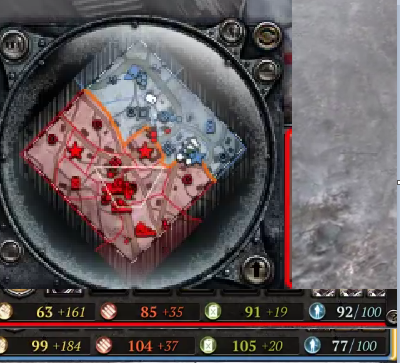But I saw this game and the losing player who controlled 1/3 of the map was receiving the most income?



Posts: 5

Posts: 17914 | Subs: 8
Posts: 1890 | Subs: 1

Posts: 5
Posts: 225 | Subs: 1

Posts: 8154 | Subs: 2
MP income is constant and depends exclusively on population and special modifiers(which there is only one, Tiger Ace).

 1
1 Posts: 3052 | Subs: 15
MP income is constant and depends exclusively on population and special modifiers(which there is only one, Tiger Ace).

Posts: 851 | Subs: 1
anyway, the screenshot...

 1
1 Posts: 3052 | Subs: 15

Posts: 851 | Subs: 1
in the first post ._.
Posts: 37


 1
1 Posts: 3052 | Subs: 15
I'm digging out this topic, because i have very similar question. I have a screenshot from my early game as OH vs UKF.
As you can see, he built two fuel caches and captured one Fuel and one regular territory point - his fuel income is +26.
I have captured 4 regular points, one Fuel and if i had captured the last uncaptured territory point, my fuel income would become same as his +26.
So my question is - would i benefit as Ostheer player from building fuel caches early game?
Because he as British player did. I know he spent 400MP and could built only 3 squads, but why would he cared? He was not suffering from bad map control and I was not able to do anything with those territories early on. Later i was busy with destroying his mortar pit and when his tanks came out, it was too late to think about his fuel caches.
I'm asking this, because in most Ostheer guides i read "hold your ground early on" but in reality, if i leave my allied opponent capture his half of the map, he can pull out tanks sooner than me. On the other side, if i harass early on, i'm bleeding MP, because grens are not that great at attacking. So i think about doing something like this - to sacrifice early map control in exchange for fuel caches. Is it a good idea for OH player?
Posts: 37

 |
|
|
31 | ||
 |
|
|
15 | ||
 |
|
|
12 | ||
 |
|
|
4 | ||
 |
|
|
4 | ||
 |
|
|
2 | ||
 |
|
|
1 |
 cblanco ★
cblanco ★  보드카 중대
보드카 중대  VonManteuffel
VonManteuffel  Heartless Jäger
Heartless Jäger 